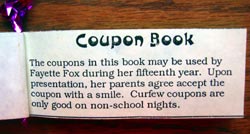|
|
December 17, 2013
Excerpted from my book, Teaching Kids to Be Good People.
 A no-tech solution to connection addiction While we’re all moving in ten directions at once, online and off, the notion of evenings and weekends where parents and kids spend unplugged time together is laughably retro. But life is neither virtual nor infinite. We’ve got to create an antidote to 21st century craziness otherwise our kids will grow up without us really knowing them and without them knowing us.
Listening (the old- fashioned way) with open eyes, mind, and heart is the best way we connect with our kids, and teach them how to connect with others. That’s what we want from them and for them. They need it now while they’re still learning about healthy relationships from us, so they can use it later when they’re creating intimate relationships of their own.
How do we teach them that the people we care about aren’t just on Facebook and Twitter, they’re right here in the real world and they deserve our attention?
Fuel for Thought—Think about a relationship you have where the other person is often “distracted.” What’s it like being with him/her? Contrast that with someone who is normally “there” with you. Now think about the level of “there-ness” you give to your family. Set a goal for the next week: Do a better job being with your family when you’re actually with them. Do not allow distractions to get in the way. Observe what happens.
Conversations That Count—Talk with your partner and child(ten) about digital distractions, including phones, games, TV shows, and computers. Ask them to rate the family (on a 1–10 scale) regarding the presence of distractions while people are talking to each other.
(Scoring scale: 1 = When we talk to each other, we’re not doing anything else; 10 = When we talk to each other there’s always a “distraction” present.)
Your 21st century child may not even have noticed or considered these “distractions” as anything other than “normal.” Ask what s/he thinks family life (vis-à-vis “distractions”) might look like when s/he’s grown up with their own family.
Teach—Create an Unplugging Challenge. Start small and doable. For example, “On Saturday from 4:00–5:00 p.m. we’re unplugging for an hour to do something fun, together, as a family.” Be ready for pushback from tweens/teens. Remind them it’s only for one hour. “Surely you guys can last 60 minutes w/o FB?!” “Yeah, of course we can, but we don’t want to!!!” The more resistance, the more likely your kids have a connection addiction. But don’t cave. Be upbeat. Take suggestions for a non-tech activity the family can do together for that short time. Play a board game, card game, make popcorn, build something, cook something, bake something, create something, take a walk, go for a bike ride, have an impromptu meal outside, read aloud from a mystery book, look at old family photos and tell stories. Etc. etc. Be together. Focus on each other. Have fun. Repeat often. Appreciate being a family. It’s the best gift there is during any season.

December 13, 2013
 We’re here to help, not judge Man, it’s been beyond chilly in California. (Mid-westerners, no snide chuckles, please. I don’t care what your definition of winter is, 23 degrees is cold.) But still, I’m into this. I love watching the dogs romping in the 5 pm sunset over at the park. I love making soup and lighting candles in my living room now packed with plants wintering inside. I love how business meetings get pushed off til January and that most people are down-shifting to a family-oriented gear. With our first grandchild on the way, I’m thinking more about the chain of love, life and the power we have, generation to generation… to teach kids to be kind, compassionate and open-minded. To help you do that, here’s an excerpt from my parenting book, Teaching Kids to Be Good People.
We assume we know so much more about other folks than we actually do. Teaching kids to be good people includes helping them understand how biases get in the way of knowing who people really are, what they need, and how we can help them (because that’s what we’re here for.)
From the We’re on This Speck Together file comes some food for thought from Carl Sagan: “For small creatures such as we, the vastness is bearable only through love.” Think back to middle or high school. What did your peers assume about you that wasn’t true? How do imagine those assumptions affected people’s relationships with you? Think about a former classmate who had a certain “reputation” which led you to have certain assumptions about him/her. How did your assumptions color your behavior toward that person?
• Talk with your child(ren) about the concept of the “judge” within us who rates other people mostly in terms of what we like/admire about them and what we don’t. Discuss how unfair it can feel to be judged, especially when the “judges” don’t really know us.
• Make a pledge to monitor your “judgmental” thoughts more carefully between now and New Year’s Day. Try to catch those critical thoughts before they become words. Each time we let The Judge put someone down, we stack another brick in the wall of misunderstanding. With less judging, we get to know each other better. Let’s teach kids to build bridges, not walls.

December 11, 2013
I originally wrote a version of this essay back in ’05 BT (before Twitter). People have requested a reprint. Here you go. Enjoy… in joy.
The year our daughter Fayette turned 15 she said she didn’t want us to buy her “stuff” for Hanukkah. Huh? What was going on? Didn’t she still love us? Wasn’t she grateful for the many carefully selected gifts she’d received since… birth? Was she running away and needing to travel light?!
 Get creative with those coupons The truth was less sinister and more profoundly personal. As she put it, “I’ve had it with holiday commercialism.” This led to a lively family discussion about Needs vs. Desires. Form vs. Substance. Carnivores vs. Vegetarians.
NOTE1: Our son Ezra was then 9 and while he dearly loved and coveted all kinds of “stuff,” (except when it came to clearing it off the floor) he agreed his sister’s idea merited serious philosophical consideration.
NOTE2: Ezra now holds an undergraduate degree in philosophy.
Despite a holiday moratorium on buying stuff there were no restrictions on loving acts of giving. So we each faced the creative challenge of figuring out what to give. That first year we abandoned traditional gift-giving our tokens of affection and admiration became more experiential and far-reaching. There were live performances and other cultural outings, food factory tours, waterfall hikes, baked desserts, multi-media presentations, and hand-crafted treasures. But the best innovation was the advent of personalized coupons books, i.e., hand-made packets offering a variety of customized “goods, services and special privileges.” The key to coupon success is knowing your recipient.
Fayette, who frequently got busted for talking on the phone after lights out, was thrilled to get: “This coupon entitles you to use the phone between 11-11:30 on a school night. Homework and all getting ready for bed preparations must first be completed.”
Ezra, who has always loved sweets, got: “This coupon entitles you to 2 dozen of your choice of home-made cookies that you don’t have to share with anyone (unless you happen to be feeling particularly generous). Minimum 24 hour notice required.”
 "Goldfish Tea" by Fayette Fox I remember happily receiving: “I will water all the plants in the house for you for 1 week.” And David, who spends lots of time hunched over his computer keyboard, was delighted to get: “I will give you a 10 minute shoulder massage.”
Just to be clear, I’m not proposing a “No Buy” Zone. We’re emerging from tough economic times and retailers (large and small) are hoping we’ve regained enough confidence in our future earning power to do our part for the recovery. The Don’t Buy Me Any Stuff” Gift Guide is not an all or nothing deal. Let’s face, there is very cool stuff in stores. And sometimes the special something your kid craves is just what you want to give, and if you can, go for it. Then knock yourself out on the kid’s joy when he/she receives your gift. All I’m saying is that you are not and never have been required to go into debt buying stuff that’s out of synch with your innate sense of what’s appropriate and healthy for your child.
So, if you’re looking for extra meaning this holiday season and a little less wear and tear on your family values, talk to your kids about alternatives to traditional gift-giving. It may not be coupons, but your family will likely come up with all kinds of great ideas. When we explore more creative ways to show our love for each other, we celebrate the uniqueness of each of family member. Now there’s a gift!
 Happy holidays from our family to yours

December 9, 2013
The following article is excerpted from my book: Teaching Kids to Be Good People
 Teach ’em to give back For the first few years of life kids aren’t always capable of telling us exactly what they want. Which is why helpful, loving parents and grandparents pepper the little ones with questions that often begin with: “Do you want _______?” Since it’s too early for real conversations, grownups fill in the blanks:
- Do you want to play with this?
- Do you want a story?
- Do you want to go to the park?
- Do you want Mint Chip or Jamoca Almond Fudge?
Our every childish wish becomes our parents’ command. That’s why we quickly we learn to say “I want _______.” Being a little kid is a sweet gig until the day when a parent says, “NO” to one of our demands, and our little brain explodes:
“What did you say?! What do you mean it’s too close to dinner? What do you mean it costs too much and you won’t buy it for me? This is outrageous!!”
We don’t have all those words, so we reiterate the obvious for stupid Mommy/Daddy:
“BUT I WANT IT!!!!!”
Tantrums don’t always work, but they work often enough for little humans to keep hope and self-centeredness alive.
At age three we tend to become more aware of the power dynamics within our family and start testing boundaries. That’s the time a parent’s “Do you want ______?” may take on a sinister ring:
- Do you want me to take that away from you?
- Do you want a time out?
- Do you want me to lose your snack?
- Do you want me to give you something to cry about?
That last rhetorical question was surprisingly popular amongst certain parents during the second half of the last century. Hopefully it’s gone the way of the landline, but I’ve got no empirical data either way.
Obviously all those years of “Do you want _______?” congealed in the spongy language and reward centers of our brain where we realize how important our happiness is to Mom and Dad. Because we are all about making it easy for them to please us, our demands become very specific as do our reasons for why they ought to be met . . . NOW:
“I want __________. And yes, I am old enough!”
“I want __________. ’Cause I’m the only one who doesn’t have one!”
“I want a new __________. ’Cause my old one sucks!”
“I want you to give me what I want, and I want you to leave me alone.” (Double demand . . . impressive language development!)
And so, for those of us who grew up in comfortable circumstances (that would be you with the latte in hand), it stands to reason we may need an attitude transplant to progress from “I want to get” to “I want to give.” But we can do it! We have the technology to connect with organizations doing awesome work. We have credit cards that make spending less painful.
Any time is a good time to look around and see where you could spread a little sunshine and some green. December is an especially good time. Some of my personal favorite do-great .orgs are Oxfam America, Good Weave, Doctors Without Borders, and Kiva. And there are at least a million others effectively working on solutions to local, national, and international challenges. Giving to any of them makes you (and any entitled kid you want to inspire) part of the solution. Start your search with the Charity Navigator and find out whose efforts you and your family want to support.
Warning—Giving can become habit forming, but in a healthy way. Besides, do you and your kids really need more stuff or might you be in the market for some good karma points?
 — Older Posts »
| |

















